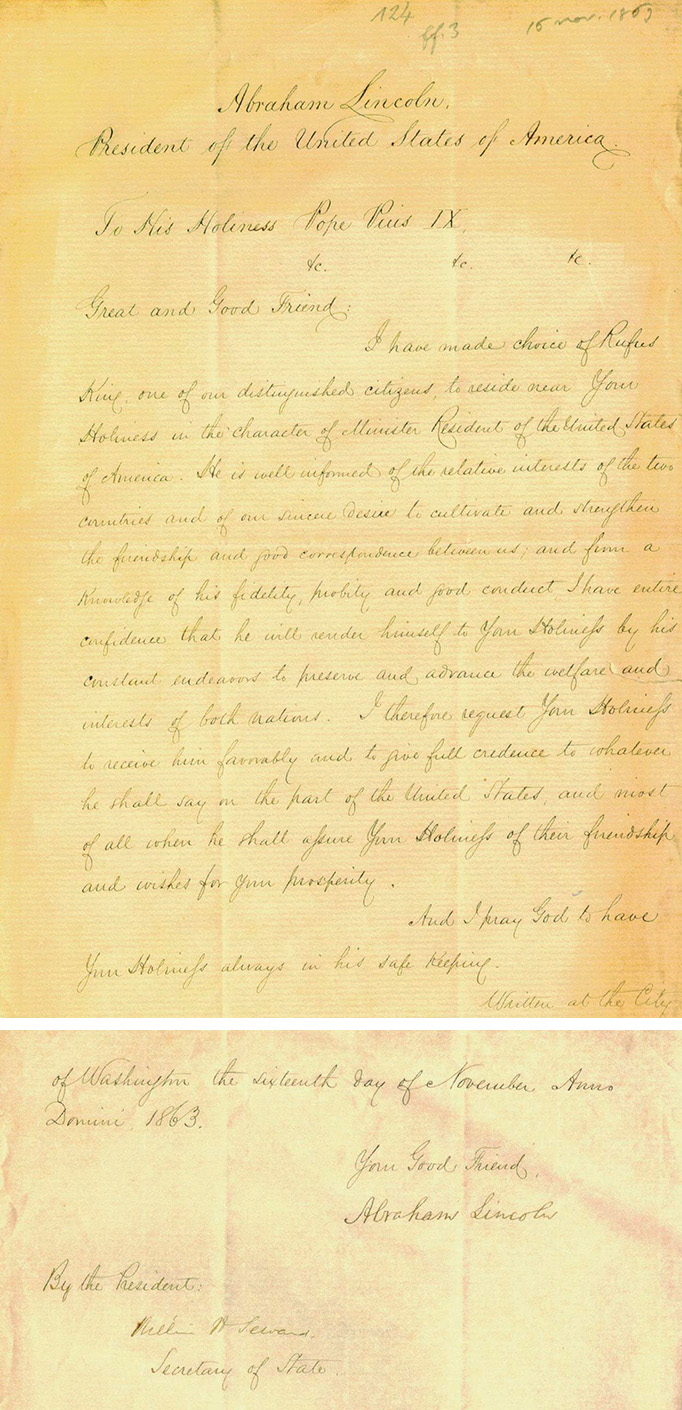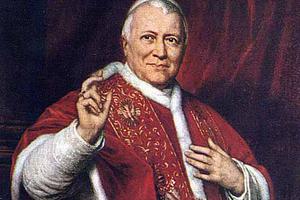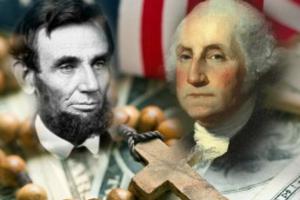Abe Lincoln’s Letter to His ‘Great and Good Friend,’ Pope Pius IX
“I pray God to have Your Holiness always in his safe keeping.”

An original copy of the Gutenberg Bible. Parchment documents, with red ribbons and wax seals affirming their veracity. Henry VIII's Bill of Divorcement from Catherine of Aragon, and his subsequent petition for annulment. Boxes and binders and bins filled with diplomatic correspondence of the Holy See and papal nunciatures and papal legations with sovereigns, princes, bishops and prelates.
All of these can be viewed in the Vatican's Secret Archives. And among the historic treasures that line more than 52 miles of shelves in the Secret Archives is a letter from U.S. President Abraham Lincoln to his “Great and Good Friend” Pope Pius IX, introducing Minister Resident Rufus King.
Who Was Rufus King?
A sociology professor once told me, when I was an undergrad studying at the University of Michigan, that the average liberal arts graduate changed careers – not jobs, but careers! – five times in his or her lifetime. Rufus King proved the point, excelling as an engineer, a journalist, a politician, even a baseball player.
King was born into a talented family: His grandfather, also named Rufus King, was a delegate from Massachusetts to the Continental Congress and later to the Constitutional Convention. His father was president of Columbia College. His son, Rufus King Jr., served as an officer in the Union Army's U.S. Horse Artillery Brigade, and was awarded the Medal of Honor. His younger son Charles King was a Brigadier General in the Spanish-American War, and earned fame as a writer of Western novels.
King himself studied at the United States Military Academy at West Point, where he graduated fourth in his class. He became an engineer – in 1833 accepting an appointment to the United States Corps of Engineers, then resigning three years later to become the civil engineer for the New York and Erie Railroad.
Not content to remain in that field, King resigned three years later to become a newspaper editor. He wrote and edited at the Albany Daily Advertiser and the Albany Evening Journal until 1839, when New York Governor William H. Seward appointed him adjutant general of the New York State Militia.
But his exceptional career didn't end there: In 1845, King left New York and moved to Wisconsin. There he excelled in politics, journalism and education – serving as a member of the 1848 Wisconsin constitutional convention, as editor and part owner of the Milwaukee Sentinel and Gazette, and as superintendent of schools in Milwaukee and a regent of the University of Wisconsin. And during the winter of 1859, King organized and played in the first three baseball games ever played in the state of Wisconsin, which were played at the old State Fairgrounds (what is now the Marquette University campus).
In 1861, the accomplished Rufus King was appointed by President Abraham Lincoln as Minister to the Papal States. However, King would not begin the assignment until two years later. When he was en route to Rome to begin his service as Minister Resident, the Civil War broke out; and before he even assumed his new post, King requested a leave of absence to join the Union Army. He was appointed a brigadier general of the Wisconsin militia, then of U.S. Volunteers, and was given authorization to raise a Wisconsin regiment. King organized and briefly commanded what came to be known as the famous Iron Brigade. He was again promoted to command of a division of the Army of the Potomac, and his military exploits included the Second Battle of Bull Run and a battle against Confederate forces led by Stonewall Jackson.
Rufus King was increasingly plagued by health problems, specifically epilepsy. When frequent epileptic seizures made it difficult to continue in military service, King resigned his commission in October 1863 and began his service as U.S. Minister to the Papal States.
The four years Rufus King served in that role brought at least one more significant accomplishment: King was instrumental in identifying and capturing fugitive John H. Surratt. Surratt was wanted in the U.S. as an accomplice to the infamous John Wilkes Booth in a failed attempt to kidnap President Lincoln. When news reached Surratt of the president's assassination, he feared he'd be implicated along with Booth; so he escaped to Montreal and then, with the help of ex-Confederate agents, he boarded a ship to England under a false name. He made his way to Italy, then to the Vatican, where he served for a time under the name John Watson in the Ninth Company of the Pontifical Zouaves, the infantry force formed in defense of the Papal States. While serving in the Zouaves, Rufus King was recognized by a former colleague who alerted Minister King; Surratt was arrested and imprisoned in Rome's Velletri prison.
Here in its entirety is the text of President Lincoln's letter to the Holy Father, introducing Rufus King.
Abraham Lincoln,
President of the United States of America.
To His Holiness Pope Pius IX,
Great and Good Friend:
I have made choice of Rufus King, one of our distinguished citizens, to reside near Your Holiness in the character of Minister Resident of the United States of America. He is well informed of the relative interests of the two countries and of our sincere desire to cultivate and strengthen the friendship and good correspondence between us; and from a knowledge of his fidelity, probity and good conduct, I have entire confidence that he will render himself to Your Holiness by his constant endeavors to preserve and advance the welfare and interests of both nations. I therefore request Your Holiness to receive him favorably and to give full credence to whatever he shall say on the part of the United States, and most of all when he shall assure Your Holiness of their friendship and wishes for your prosperity.
And I pray God to have Your Holiness always in his safe keeping.
Written at the City of Washington
the sixteenth day of November Anno Domini 1863,
Your good friend,
Abraham Lincoln

- Keywords:
- pius ix
- abraham lincoln

















